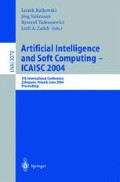Abstract
Population based methods, and among them, the population learning algorithm (PLA), can be used to train artificial neural networks. The paper studies the probability distribution of solution time to a sub-optimal target in the example implementation of the PLA-trained artificial neural network. The distribution is estimated by means of the computational experiment. Graphical analysis technique is used to compare the theoretical and empirical distributions and estimate parameters of the distributions. It has been observed that the solution time to a sub-optimal target value fits a two parameter exponential distribution.
Access this chapter
Tax calculation will be finalised at checkout
Purchases are for personal use only
Preview
Unable to display preview. Download preview PDF.
References
Aiex, R.M., Resende, M., Ribeiro, C.: Probability distribution of solution time in GRASP: an experiment investigation. Technical Report, AT&T Labs Research, Folorham Park, NJ07733 (2000)
Aiex, R.M., Binato, S., Resende, M.G.C.: Parallel GRASP with path-relinking for job shop scheduling. Parallel Computing 29, 393–430 (2003)
Czarnowski, I., Jȩdrzejowicz, P.: Application of the Parallel Population Learning Algorithm to Training Feed-forward ANN. In: Proceedings of the Euro- International Symposium on Computational Intelligence (E-ISCI), Kosice (2002)
Czarnowski, I., Jȩdrzejowicz, P.: Population Learning Metaheuristic for Neural Network Training. In: Rutkowski, L., Kacprzyk, J. (eds.) Neural Networks and Soft Computing. Advances in Soft Computing, pp. 161–166. Springer, Heidelberg (2002)
Czarnowski, I., Jȩdrzejowicz, P., Ratajczak, E.: Population Learning Algorithm - Example Implementations and Experiments. In: Proceedings of the Fourth Metaheuristics International Conference, Porto, pp. 607–612 (2001)
Jȩdrzejowicz, P.: Social Learning Algorithm as a Tool for Solving Some Difficult Scheduling Problems. Foundation of Computing and Decision Sciences, vol. 24, pp. 51–66 (1999)
Merz, C.J., Murphy, P.M.: UCI Repository of machine learning databases. Department of Information and Computer Science. University of California, Irvine (1998), http://www.ics.uci.edu/~mlearn/MLRepository.html
Chambers, J.M., Cleveland, W.S., Kleiner, B., Tukey, P.A.: Graphical Methods for Data Analisys. Chapman & Hall, Boca Raton (1983)
Author information
Authors and Affiliations
Editor information
Editors and Affiliations
Rights and permissions
Copyright information
© 2004 Springer-Verlag Berlin Heidelberg
About this paper
Cite this paper
Czarnowski, I., Jȩdrzejowicz, P. (2004). Probability Distribution of Solution Time in ANN Training Using Population Learning Algorithm. In: Rutkowski, L., Siekmann, J.H., Tadeusiewicz, R., Zadeh, L.A. (eds) Artificial Intelligence and Soft Computing - ICAISC 2004. ICAISC 2004. Lecture Notes in Computer Science(), vol 3070. Springer, Berlin, Heidelberg. https://doi.org/10.1007/978-3-540-24844-6_21
Download citation
DOI: https://doi.org/10.1007/978-3-540-24844-6_21
Publisher Name: Springer, Berlin, Heidelberg
Print ISBN: 978-3-540-22123-4
Online ISBN: 978-3-540-24844-6
eBook Packages: Springer Book Archive

